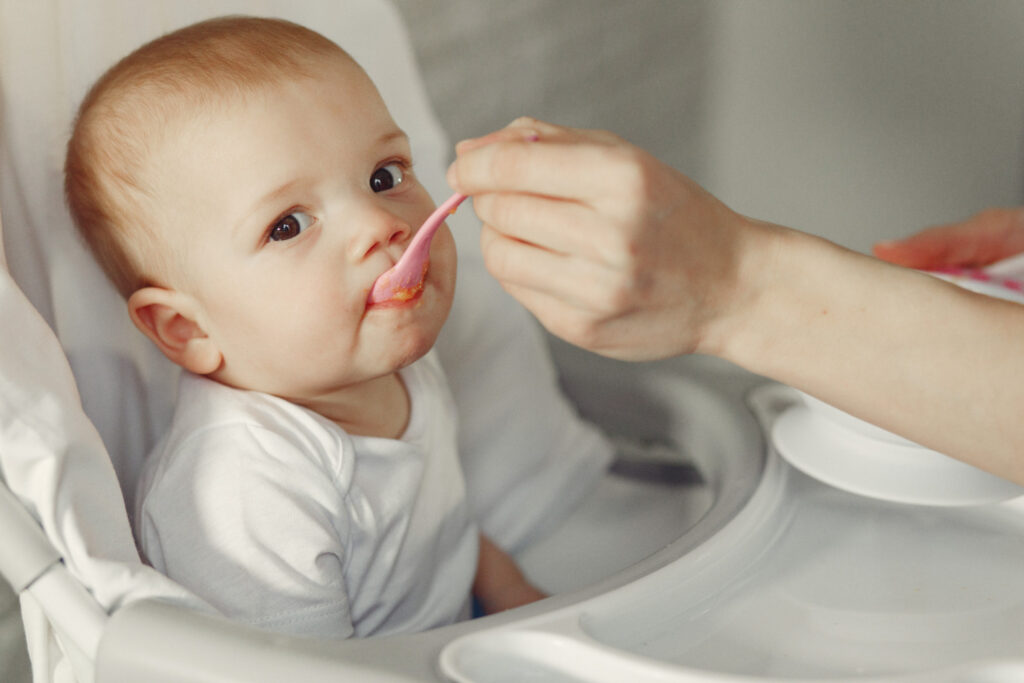A baby food business means preparing and selling nutritious food for infants and young children. The aim of this business is to provide parents with healthy, convenient, and safe food options. Products may include pureed fruits, vegetables, cereals, and special snacks that meet the nutritional needs of children. This business can be run from home, through retail stores, or as regular deliveries through subscription services.

Table of Contents
1.Analyzing Demand and Competition in the Baby food Sector
Market research is an important step that must be done before you enter the baby food sector. In this, you need to know how much demand there is in this sector and who your competition is. First, you have to identify the target customers, i.e. parents who are looking for nutritious and safe food for their children.

For this, you can use online surveys, feedback forms, and social media. Also, analyze existing baby food brands and their product range, pricing, and marketing strategies. Try to know which products are popular and what improvements customers want. This information will help you strengthen your position in the market and prepare a successful business plan.
2. Business Plan: Products, Target Market and Financial Projection
While creating a business plan, first you need to prepare a detailed plan of your products. This will include the different types of baby food you offer such as purees, cereals, snacks, etc. Next, analyze your target market; understand who your potential customers are, what their income and likes and dislikes are. For this, you can conduct market surveys and study your competitors.
In the financial projection, you need to estimate the initial investment, operating costs, and potential profits. This will include the cost of ingredients, packaging, production, marketing, and distribution. Also, make sure that your plan has a clear guide for business growth and potential profits. This will give you a clear picture of the financial sustainability of your business and help you make the right decisions in the early stages of the business.
3. Legal Requirements and License Procedure for Starting a Baby food Business
When starting a baby food business, it is extremely important to fulfill the legal requirements. First of all, you have to register your business so that it becomes a valid legal entity. For this, you can register at your local district office or corporation office. After this, it is necessary to obtain a license under the Food Safety and Standards Act (FSSAI).

This license ensures the quality and safety of your products. For this, you have to apply on the FSSAI website and submit the required documents. Additionally, you may also have to obtain the necessary permissions to meet the local hygiene and health standards. By completing all the legal formalities, you can operate your business legally and provide safe and quality products to the customers.
4. Developing nutritional and age-appropriate recipes
An important step in the baby food business is to develop nutritional and age-appropriate recipes. First, you need to understand what foods are suitable for children of different age groups and what their nutritional needs are. For example, thin purees and soups for newborns, while older children may have solid foods such as oatmeal, yogurt, and legumes.
To ensure that your recipes are safe and nutritious, you should seek the advice of medical and nutrition experts. Next, test different recipes, taking into account both taste and nutrition. When preparing recipes, also keep in mind consistency, taste, and the possibility of allergies. After testing recipes, you also need to focus on appropriate packaging and labeling, which gives the correct information to the consumer and ensures food safety.
5.Finding reliable suppliers for ingredients and packaging material
Supplier sourcing is a crucial step when you are starting a baby food business. For this, you must first prepare a complete list of food ingredients and packaging material requirements. Next, search for reliable and certified suppliers who can provide high-quality and safe products. You can research various online platforms such as Amazon, Flipkart, and local markets, and order samples from potential suppliers so that you can check their quality.

To maintain a good relationship with suppliers, it is necessary to track their services and regularity of supply. Apart from this, you can also negotiate the cost and terms so that your costs are under control. Identifying reliable suppliers is extremely important for the success of your business, as it ensures that your products are fresh, safe, and of high quality.
6.Prepare a kitchen or production area that meets health and safety standards
To start a baby food business, the most important step is the production setup. This means that you must prepare a kitchen or production area that meets all health and safety standards. First, make sure that the cleanliness and hygiene of your kitchen or production area is taken care of. All equipment and materials should be cleaned and sanitized regularly.
Use separate areas for food preparation and storage to avoid cross-contamination. Also, make sure that all food safety standards, such as cooking and storing food at the proper temperature, are followed. If you are producing from home, make sure that your kitchen setup meets your business needs and is approved by the health department. It is also necessary to obtain the proper licenses and certifications to ensure the quality and safety of your product.
7.Develop a Brand Identity and Marketing Strategy to Reach Your Target Audience
Branding and marketing are the keys to success for your baby food business. First, you need to create a strong brand identity, which includes a catchy name, logo, and color scheme. This identity will differentiate your products from other brands and create a positive image in the minds of customers. Next, create an effective marketing strategy that includes social media, online advertising, and local promotional activities to reach your target audience—that is, parents and families. Highlight the quality of your product and its features and clearly communicate the benefits that your meals offer.
Use customer reviews and suggestions and connect with them through various promotional offers such as discounts or special pack offers. Thus, a well-organized brand identity and strategic marketing can steer your business in the right direction.
8. Estimated Initial Investment Cost
The initial investment cost for starting a baby food business can range from around ₹40,000 to ₹70,000. This investment involves various aspects. First, you need to take care of legal and license fees, which are related to food safety and business registration. Next, there is the cost of traditional ingredients and packaging, which includes the purchase of nutrient-rich foods and attractive packaging.

For the production setup, a clean and safe kitchen has to be arranged, which includes utensils, equipment, and food management. Apart from this, there is also spending on branding and marketing so that your business is promoted properly. Finally, there is arranging for distribution channels, such as home delivery or retail stores, which can affect your costs. With such an investment, you can build a solid foundation and start your baby food business.
Conclusion
A baby food business is a profitable venture that aims to provide nutritious, convenient, and safe food options for infants and young children. Through products such as pureed legumes, vegetables, cereals, and specialty snacks, you meet the needs of parents looking for high-quality food for their children. This business model can be run from home, through retail stores, or as regular deliveries through subscription services. With the right planning and execution, you can establish a business that supports families and meets the growing demand for healthy baby food options.
If u want to Watch the Video You can visit to our You tube Businovations Channel and watch the video……
Click the link to read the Recent Posts….
Gift Hamper Business: Low Investment Startup (190)
A Guide to Starting a Low-Cost Home-Based Daycare Business (191)


One thought on “Start Baby Food Business with Effective Steps (229)”